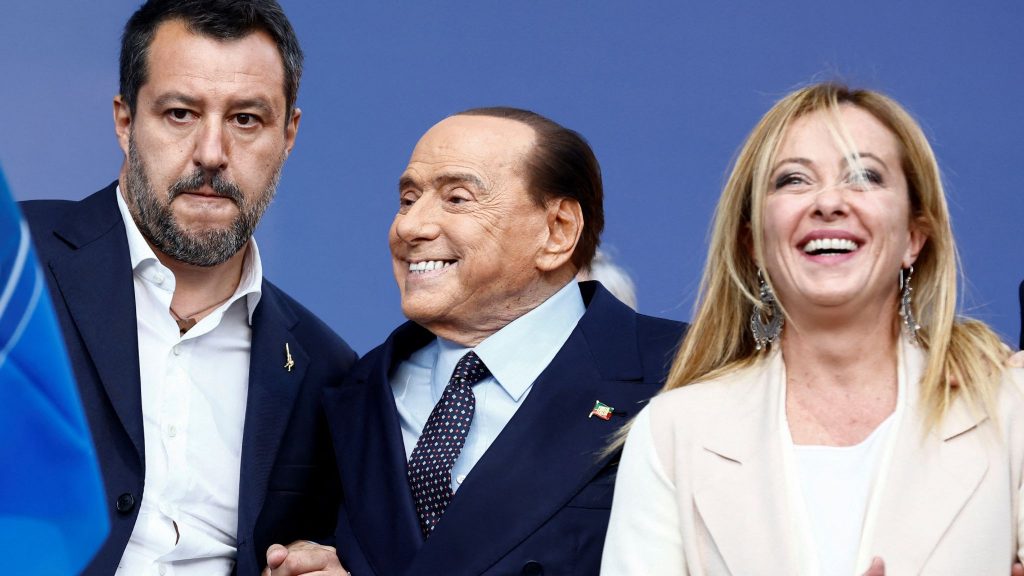The final results of the Italian elections show a victory for the right-wing coalition, led by the ultra-right-wing Fratelli d’Italia (Brothers of Italy), headed by their candidate, Giorgia Meloni. But the real winner is abstentionism, which in this election reached a historic 36 percent. According to a common maxim, “What is useful to win an election is not useful to govern afterward.” Thus, a key question is how the winning coalition’s reactionary discourse will be transformed in the new administration.
Results: The Right Wing and Abstentionism Win
The vote count for the Italian parliamentary elections ended early Monday afternoon. From the first polls published Sunday night after the polls closed, the surveys published in the final weeks of election campaign were confirmed: the right-wing coalition won with a wide margin over the center Left, with Meloni’s Fratelli d’Italia garnering the highest share of votes.
The winning coalition got close to 44 percent of the vote, with the Fratelli d’Italia at 26 percent, Mateo Salvini’s right-wing Lega below 9 percent, Silvio Berlusconi’s Forza Italia just above 8 percent, and the minor center allies at almost 1 percent.
The center-left coalition was defeated by almost 20 points, earning around 26 percent of the vote, with the Partido Democratico at 19 percent, the Greens-Left at 3.6 percent, +Europa with 2.8 percent, and Impegno Civico at 0.6 percent. The populist Five Star Movement party, led by former prime minister Giuseppe Conte, confirmed its recovery after last summer’s slump, picking up more than 15 percent of the vote.
For its part, abstention rose from just over 28 percent in 2018 to 36 percent, the highest percentage in the history of parliamentary elections in Italy. In fact, turnout did not exceed 60 percent in any of the southern regions. This confirms the great disconnect between the “ruling” parties, the institutions, and the masses, especially among the youth (where the abstention rate is close to 50 percent) and in the South.
The Right Wing in Government: Perspectives and Contradictions of a Reactionary Nationalist Discourse
Fratelli d’Italia’s winning bet was to openly claim a Catholic-nationalist profile in clear opposition to the Mario Draghi government, which fell in July, and to channel part of Italy’s social discontent. The results of Sunday’s election show that a majority of people reject the parties that had declared themselves full supporters of the “Draghi agenda,” including both the liberal Left and the center Left.
The enthusiastic campaign statements of Meloni, Salvini, and their candidates were the counterpoint to EU Commission president Ursula Von Der Leyen’s ambiguous yet authoritative statement: “If things go in a difficult direction [in Italy] — and I’ve spoken about Hungary and Poland — we have the tools.” Von Der Leyen was referring to statements, threats, and sanctions against those countries with “illiberal” governments that do not vote according to “European values.” The statement indicates the kind of “democratic” attitude with which European centrist liberals confront nationalist right-wingers.
At a time when the European Union is marked by different, if not conflicting, approaches to the geopolitical situation, the war in Ukraine, and the bloc’s more or less subordinated relationship to the U.S. and NATO, the triumph of a reactionary opposition party like Fratelli d’Italia is a factor of instability that restores a small amount of hope to the pro-Putin front. This was even recognized by the Russian media, which claims that Italy could become a new thorn in the side of the European Union.
It’s probably more reasonable, however, to say that full adherence to the EU framework and NATO and U.S. interference in Italian politics will be the thorn in the side of a government led by two parties, Fratelli d’Italia and Lega, which have centered a sovereigntist, anti-European and geopolitical revisionist rhetoric, as opposed to the liberal pro-European approach of Forza Italia and its Christian Democrat allies.
Yet electoral rallies are one thing; actual commitments to a pro-NATO and anti-Russian line are quite another. The latter have been the premise of the common program of the center Right, and they will cause profound government crises if seriously questioned by Meloni and Salvini. As for the national economy, the desire to be a “respectable” right wing — neither openly fascist nor too subversive with respect to the EU, NATO, and other strong powers — will force Meloni to face a public debt that has exceeded 150 percent of the GDP. It will be difficult to find money for new expansive policies without again cutting spending on infrastructure and on the welfare state, and without again attacking the working class, as the capitalists keep demanding.
Over the next few days, the composition of parliament will be solidified, and the government will establish who will occupy the different institutional positions, starting with that of prime minister. The right-wing victory, which has a majority but less than two-thirds of parliamentary seats, will make it difficult both to change the constitution in an authoritarian-presidential direction, as Meloni had thought about doing, and to form a government without the mediation of the rest of the state apparatus and pressure from the EU bureaucracy.
What’s clear is that the policies of the previous Draghi government, and therefore also of the center Left, have paved the way for the rise of the right wing, without constituting any substantial alternative in terms of rights, conditions of the working class and the poor, repression, nationalism, and militarism.
It is still unclear, however, where the right-wing government will begin its attacks. These attacks run the risk of jeopardizing the coalition’s already-minority consensus in society and amid the working class and poor, given the record-low turnout. While Meloni claims to champion these groups and “govern for everyone,” she won with the votes of the most intolerant and reactionary Catholics. Creating a stable government that will last five years will be very difficult, despite this clear electoral victory.
Despite the declarations of harsh opposition issued by Enrico Letta of the Democratic Party and by Conte, it is clear that the social opposition to this reactionary government will have to be built without the help of the other parliamentary parties. This opposition must work to overcome the crisis that the policies of the old (and new) reformist currents have generated.
An excellent response, in this sense, is that of the students of Manzoni high school in Milan, who on Monday occupied the student center to hold a plenary assembly to discuss the situation and what policies to demand in their fight against the new government. These kinds of actions help show the way forward for the working class at this moment.
First Published in Spanish on September 24 in La Izquierda Diario.
Translation by Molly Rosenzweig











